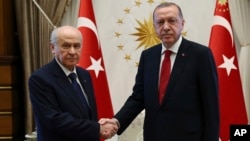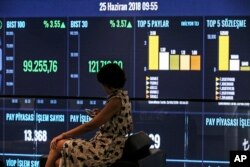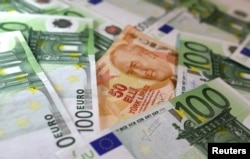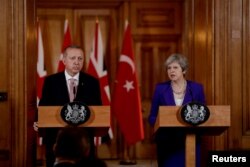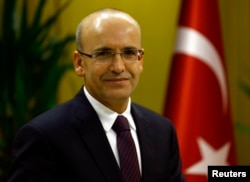While Turkish President Recep Tayyip Erdogan easily handled his presidential rivals in the June 24 election, analysts warn that economic and financial challenges may be far more formidable foes.
There was a muted reaction by financial markets to Erdogan's victory and his ruling AKP party also maintaining control of parliament, albeit with its electoral partner the MHP Party. Initial gains in the lira and stock market quickly dissipated.
Analysts suggest there is relief the election did not result in the presidency and parliament falling to rival parties, as predicted by several opinion polls. Economist Inan Demir of Nomura International said political deadlock was a concern.
“The market focus is the stability of the political configuration so that the president will have room to operate, without having to contradict a different parliamentary block at each step. Therefore removing the need for fresh elections.” Demir said.
Demir says the market’s real focus is on the Turkish president’s ability to address pressing economic challenges.
In the past two years, Erdogan has used massive spending programs to prime the economy, pushing the growth rate above a seven percent annual rate. Before the June election, spending was further ramped up with multi-billion dollar payments to the retired, along with other expensive commitments.
International rating agencies and the IMF have repeatedly warned the Turkish economy is overheating, driving up inflation and risking a crash. Such concerns saw the lira plummet last month as investors fled the Turkish market. Order was only restored by emergency hikes in interest rates now among the highest in the world.
With the elections out of the way, pressure on Erdogan to rebalance the economy with austerity measures is growing. “Such policies will be key to restoring confidence in the economy,” wrote Moody’s credit rating agency this month, “and provide greater assurance of Turkey’s ability to obtain the requisite funding for its large current account deficit and to meet its external repayment requirements.”
Turkey’s is borrowing more than $15 billion monthly from global markets to meet its financial obligations.
“Erdogan has a dilemma,” political analyst Atilla Yesilada of Global Source Partners said, “the external balance of the Turkish economy requires conventional policies, austerity packages, structural reforms. But the internal balance needs more-spending expansionary policies. Erdogan is clearly stuck.”
Erdogan may balk at austerity and continue spending because of fears the Turkish economy is heading towards a recession. “Even before the May (interest) rate hikes Turkish loan rates were at a 10 year high,” Yesilada said, “already private banks have nearly stopped making new loans, so we are going into this phase called a credit crunch, where loans are not available at any price, and that’s extremely recessionary.”
Erdogan’s room to maneuver is further limited because his AKP Party needs the support of MHP Party for a majority. While the Turkish president has gained sweeping new powers with his re-election, parliament must still ratify any budget issued by Erdogan. The MHP has voiced strong opposition to austerity.
Analysts predict any recession would likely occur in autumn with the end of the tourism season, coinciding with the stimulus effects fading from the June election giveaways.
The timing is inconvenient for Erdogan with a recession expected to last for at least six months, coinciding with nationwide municipal elections.
Analysts say reform is also key to Erdogan regaining the financial markets confidence in his stewardship of the economy. He unnerved markets during his May visit to London, where he insisted on his unorthodox economic view that low rather than high interest rates are needed to tame Turkey's double-digit inflation, reportedly telling investors “you need to learn.”
“Everyone expressed amazement at Erdogan’s boldness to come to London to tell them they are all wrong about interest rate theory,” Yesilada said.
An essential sign for international investors in determining Erdogan’s intentions is his choice of ministers. Mehmet Simsek the outgoing deputy prime minister, who used to work for the international banking firm Merrill Lynch, is the name investors are looking for, “It’s an important name,” claims Nomura economist Demir.
But Yesilada cautions that Simsek’s appointment alone isn’t enough to soothe international concerns.
“Mehmet Simsek is a good name, but also needs to be given authority. His portfolio has been significantly reduced. Mr. Simsek needs to come out with a well articulated, time bonded program of spending cuts. If the expectations are not fulfilled, the pre-election sell-off will continue, as it would send a message Erdogan is not ready to change.” Yesilada said.




